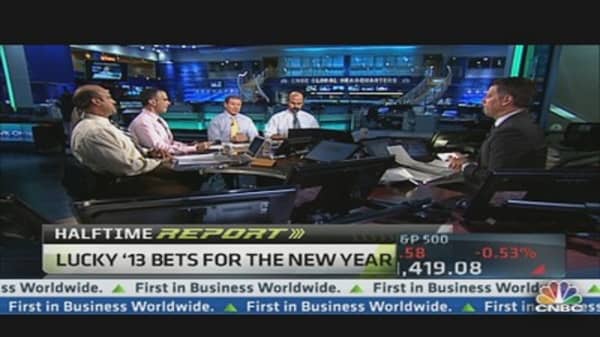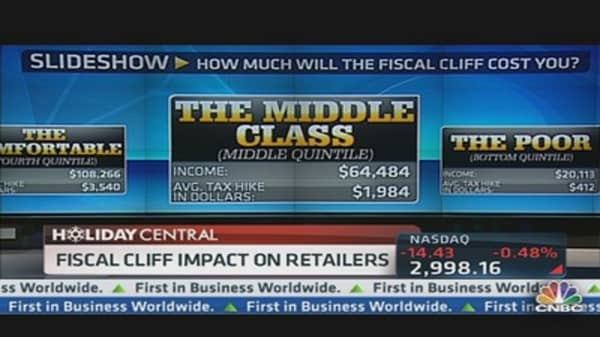Worries over the fiscal cliff and an extremely weak report on the holiday shopping season put major retail stocks including Macy's, Wal-Mart and Target under pressure. Coach, Abercrombie & Fitch and Ralph Lauren were also sharply lower. (Read More:
Nervous Retailers Hope for Post-Christmas Rush
)
Sales in the two months before Christmas rose just 0.7 compared to last year, the slowest rate of growth since 2008, according to the MasterCard Advisors Spending Pulse. Analysts had been expecting growth of 3 to 4 percent.
Amazon.com was lower after Netflix said an outage at an Amazon web service center impacted subscribers in the U.S., Canada, and Latin America on Christmas eve. Service was fully restored by Christmas day.
Meanwhile, Apple weighed on the tech sector and the Nasdaq 100 index, slipping more than 1 percent.
Research In Motion soared to lead the Nasdaq 100 gainers as pictures of what is believed to be the newest BlackBerry device with a physical keyboard made rounds on the Internet. The BlackBerry 10 launch event is expected to take place on January 30.
Marvell Technology plunged more than 10 percent after a federal jury ordered the semiconductor company to pay $1.2 billion in damages in a patent infringement lawsuit against Carnegie Mellon University.
Herbalife rallied, snapping a nine-day losing streak, after the nutrition and skin-care products company retained a legal firm to help defend itself against attacks by hedge fund manager Bill Ackman, according to the Wall Street Journal. Last week, Ackman shorted the Herbalife's stock and accused the company of operating a pyramid scheme.
On the economic front, the S&P/Case Shiller home price index of 20 major cities rose 0.7 percent in October on a seasonally adjusted basis, topping expectations for a gain of 0.5 percent. And prices in the 20 cities jumped 4.3 percent from last year, beating forecasts for an increase of 4.0 percent.
Meanwhile, the Federal Reserve Bank of Richmond said manufacturers in the central Atlantic region posted modest activity in December, but at a slower pace than in November.





